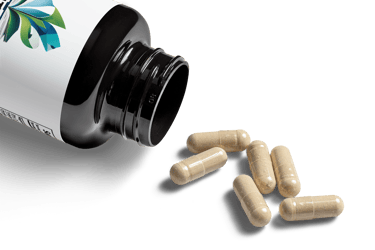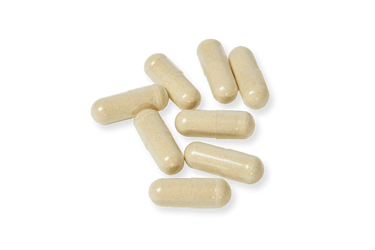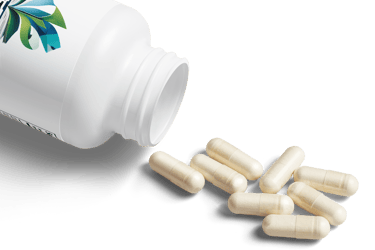Dive Deeper: The Science Behind Our Supplements
Omega-3 Fish Oil
Omega-3 fatty acids, particularly Eicosapentaenoic Acid (EPA) and Docosahexaenoic Acid (DHA), are crucial for brain health and function. Research indicates that children with ADHD often have lower levels of these essential fatty acids [3]. Omega-3s play a neuroprotective role, especially in contexts of inflammation or immune activation, and are vital for maintaining healthy neuronal membranes and efficient brain signaling [3].
A comprehensive systematic review of 16 randomized controlled trials involving over 1,500 children and young people with ADHD explored the role of omega-3/6 fatty acids. The findings reported favorable benefits on various ADHD symptoms, including improvements in hyperactivity, impulsivity, attention, visual learning, word reading, and working/short-term memory [1]. Researchers have specifically noted that supplementing with omega-3s can consistently lessen hyperactivity, as observed by parents and teachers, suggesting their potential as a valuable supplement to established therapies [2].
Further studies have highlighted specific benefits, such as improvements in overall inattention, reduced disobedience, and better spelling in children with ADHD who regularly supplemented with omega-3s [2]. Research from Germany also indicates that omega-3 supplementation can enhance "working memory," a key component for learning [2]. Additionally, for children with ADHD experiencing sleep problems, omega-3/omega-6 supplements (including GLA) have shown promise in improving sleep quality, reducing daytime fatigue, and fostering better cooperation [2].
Clinical guidelines suggest that omega-3 PUFA supplementation, particularly with a combination of DHA and EPA, may improve clinical and cognitive symptoms in ADHD, with benefits observed typically after a minimum duration of 12 weeks. These guidelines recommend thorough consultation with a primary psychiatrist, considering omega-3s as an augmentation strategy to maximize treatment efficacy when a child is responding well to current medication, and monitoring for optimal dosage and ratio [3].
Magnesium + Zinc
Magnesium and Zinc are essential minerals critical for numerous biochemical reactions and play significant, complementary roles in neurological health.
Magnesium: Supporting Behavioral & Cognitive Well-being
Magnesium is crucial for over 300 enzymatic processes, impacting nerve and muscle function, energy production, and neurotransmitter activity. Research suggests that individuals with ADHD may have lower magnesium levels in their blood [5]. Magnesium is vital for regulating various brain functions and ensuring the proper activity of key neurotransmitters like dopamine, norepinephrine, and serotonin, which are often implicated in ADHD [4].
A double-blind, randomized controlled clinical trial exploring magnesium's effects in children with ADHD observed that supplementation, often alongside Vitamin D, led to significant improvements in conduct problems, social problems, and anxiety/shyness scores [6]. Another study found a high prevalence of magnesium deficiency in children with ADHD, reporting that magnesium supplementation as an add-on therapy improved cognitive functions as measured by standardized tests [5]. These findings highlight magnesium's foundational role in supporting overall neurological well-being and managing certain behavioral and cognitive challenges associated with ADHD.
Zinc: Enhancing Attention and Overall Symptoms
Zinc is another vital micronutrient involved in neurotransmitter metabolism and brain function, with some research indicating a relationship between zinc deficiency and ADHD symptoms [5]. A systematic review and dose-response meta-analysis of six randomized clinical trials found a significant beneficial effect of zinc supplementation on overall ADHD total scores in children [8].
While individual impacts on hyperactivity or inattention scores were not always independently significant in that meta-analysis [8], other research has explored specific benefits. A clinical trial investigating zinc augmentation alongside traditional medication for children with ADHD found a significant improvement in inattention scores in the group receiving zinc [9]. Additionally, ongoing research is exploring how zinc-rich dietary interventions might specifically improve signs and symptoms of ADHD in specific populations, such as teenage girls, by influencing factors like response times and attention [10]. These findings suggest zinc supplementation may offer supportive benefits for improving ADHD symptoms, particularly in enhancing attention.
Ashwagandha + Black Pepper Extract
Our Ashwagandha + Black Pepper Extract combines two powerful botanical compounds known for their synergistic effects on well-being and nutrient utilization.
Ashwagandha (Withania somnifera): The Adaptogenic Powerhouse
Ashwagandha is an ancient adaptogenic herb, highly valued in Ayurvedic tradition for its capacity to help the body adapt to various stressors. Its broad pharmacological qualities make it relevant for supporting overall mental and physical resilience [12].
Stress, Anxiety, and Mood Support: Clinical trials consistently suggest that ashwagandha extracts can significantly help reduce perceived stress and anxiety levels, often leading to improvements in sleeplessness and fatigue. Studies have shown it can reduce serum cortisol levels, a key stress hormone, contributing to a greater sense of calm [12]. Recent human trials have also indicated positive effects on general mood and a reduction in anxious feelings [12].
Cognitive and Executive Function: Beyond stress management, ashwagandha has shown promise in supporting cognitive performance. Studies in healthy young adults indicate that supplementation may improve various measures of memory, attention, vigilance, and executive function, while simultaneously decreasing perceptions of tension and fatigue [13]. These benefits are thought to arise from its neuroprotective actions, including antioxidant activity, modulation of neurotransmitters like GABA and glutamate, and promotion of synaptic plasticity [14].
Preliminary Research on ADHD Symptoms: Emerging research is exploring ashwagandha's direct impact on ADHD symptoms. A prospective, double-blind, randomized, placebo-controlled preprint study (meaning it has not yet undergone full peer review at the time of publication) involving children aged 5–12 years with ADHD indicated that ashwagandha root extract led to significantly higher improvements in ADHD scores, as well as in behavioral, emotional, and cognitive regulation, compared to placebo. It also showed improvements in quality of life measures [11]. While these initial findings are promising, further rigorous randomized clinical trials are necessary to establish definitive clinical recommendations.
Black Pepper Extract (Piperine): The Bioavailability Enhancer
Black pepper extract, primarily known for its active compound piperine, plays a crucial role in enhancing the efficacy of ashwagandha and other nutrients.
Enhanced Absorption: Piperine is a well-documented bioavailability enhancer, meaning it can significantly improve the body's ability to absorb and utilize beneficial compounds, including those found in Ashwagandha [16]. This ensures that you get more out of the nutrients you consume.
Potential Independent Cognitive Effects: Beyond its absorption-enhancing role, preliminary research, primarily in animal models, suggests that piperine may possess independent cognitive-enhancing and antidepressant-like activities [15]. While these findings are promising, more human studies are needed to fully understand piperine's direct neurological benefits in humans.
Gut-Brain Axis Connection (Emerging Research): Broader research into components of peppers, such as capsaicin, highlights their potential to influence the gut microbiota and, through the microbiome-gut-brain axis, potentially impact central nervous system conditions, including ADHD [17]. This represents an exciting, though early-stage, area of investigation into the complex interactions between diet, gut health, and neurological function.
Adaptogenic Mushroom Blend
Our Adaptogenic Mushroom Blend combines potent fungi known for their unique health benefits and their potential to support various aspects of brain health and resilience. This blend features Cordyceps Sinensis, Shiitake, and Lion's Mane, working synergistically to promote overall vitality.
Lion's Mane (Hericium erinaceus): Supporting Cognitive Function and Memory
Lion's Mane mushroom is gaining significant attention for its potential neurotrophic properties, largely attributed to compounds like hericenones and erinacines, which are believed to stimulate Nerve Growth Factor (NGF) [20]. This makes it a subject of interest for cognitive enhancement and mental health.
Memory and Executive Function: Lion's Mane has been explored for its capacity to enhance working memory, short-term recall crucial for learning, and daily executive functioning. A research protocol outlines plans for studies in rodent models designed to specifically investigate Lion's Mane's ability to improve working memory in an ADHD-like context [20].
Potential Mechanisms in ADHD: Beyond observed cognitive effects, in vitro (cell-based) and computational studies have begun to explore Lion's Mane's potential mechanisms relevant to ADHD. Research suggests that phytoconstituents within Lion's Mane, such as myo-inositol, may interact with key therapeutic targets for ADHD, including the SLC6A4 protein (a serotonin transporter), indicating a promising area for further investigation [18]. This preliminary work highlights the mushroom's potential to influence brain pathways associated with attention and regulation.
Cordyceps Sinensis: Enhancing Learning and Mood
Cordyceps is a unique adaptogenic mushroom traditionally valued for its role in boosting energy and supporting overall vitality. Modern research is beginning to uncover its specific effects on cognitive function and mood.
Learning and Memory: Studies in animal models have demonstrated that Cordyceps (specifically Cordyceps militaris polypeptide) may improve learning and memory, particularly in models of cognitive impairment. The observed benefits are thought to occur through mechanisms such as scavenging oxygen-free radicals, preventing oxidative damage, and providing neuroprotection to the nervous system [18].
Mood Support: Furthermore, network pharmacology and molecular docking studies have investigated the potential antidepressant mechanisms of Cordyceps sinensis. This computational research suggests that active ingredients in Cordyceps may exert beneficial effects on mood by interacting with important biological targets and modulating key signaling pathways within the nervous system [19]. While these findings are promising, they highlight areas for future clinical research.
Shiitake (Lentinula edodes): Supporting Immunity and Reducing Inflammation
Shiitake mushrooms are a popular functional food, valued not only for their culinary uses but also for their robust health-promoting properties.
Immune System Modulation: A randomized dietary intervention study in healthy young adults demonstrated that regular daily consumption of whole, dried Shiitake mushrooms significantly improved human immune function. Participants showed increased proliferation and activation of key immune cells (γδ-T and NK-T cells) and an increase in secretory immunoglobulin A (sIgA), which suggests enhanced gut immunity [21].
Reduced Inflammation: The study also observed a reduction in C-reactive protein (CRP) levels, a significant marker of inflammation, indicating that the immune improvements occurred under less inflammatory conditions [21]. While this study primarily focuses on immunity, reduced systemic inflammation and improved gut health are increasingly recognized as contributors to overall well-being, including aspects of brain health.
Important Disclaimer: These statements have not been evaluated by the Food and Drug Administration. These products are not intended to diagnose, treat, cure, or prevent any disease. Always consult with a qualified healthcare provider before starting any new supplement, especially if you have a medical condition or are taking medication.








https://www-sciencedirect-com.proxy.lib.pdx.edu/science/article/pii/S2666354621001137
https://www-sciencedirect-com.proxy.lib.pdx.edu/science/article/pii/S1110863015000555
https://www.medicalnewstoday.com/articles/magnesium-and-adhd#benefits
https://www-sciencedirect-com.proxy.lib.pdx.edu/science/article/abs/pii/S0165178118318456
https://www-sciencedirect-com.proxy.lib.pdx.edu/science/article/abs/pii/S1876201819308019
https://nsuworks.nova.edu/cgi/viewcontent.cgi?article=1015&context=hpd_com_nutrition
https://ods.od.nih.gov/factsheets/Ashwagandha-HealthProfessional/
https://www-sciencedirect-com.proxy.lib.pdx.edu/science/article/abs/pii/S0278691508003049
https://www.frontiersin.org/journals/nutrition/articles/10.3389/fnut.2025.1551650/full
Peer-Reviewed Sources
Empowering neurodivergent learners through tailored tutoring.
Connect
michael.vs@beyondthedesktutoring.org
503-317-6271
© 2025. All rights reserved.
